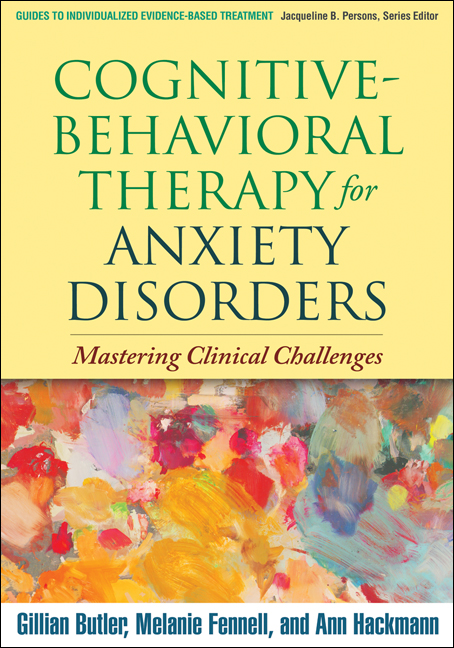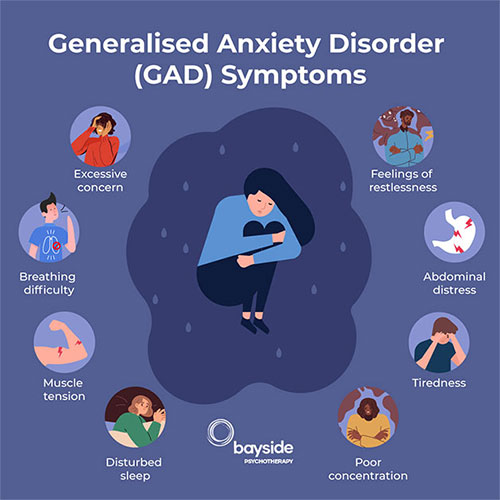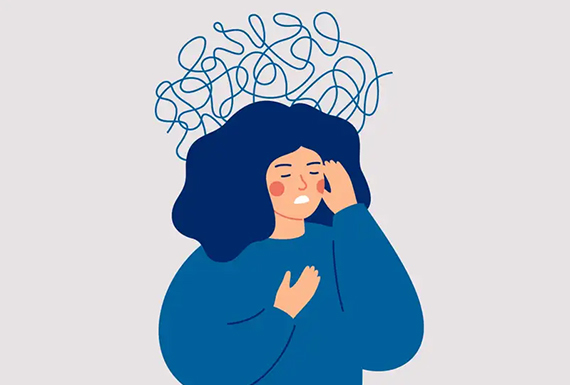Research-driven counselling for anxiety with caring guidance
Research-driven counselling for anxiety with caring guidance
Blog Article
Checking Out Various Approaches in Counselling for Stress And Anxiety Condition for Long-term Change
When tackling stress and anxiety conditions, it's vital to discover a variety of therapy techniques. Each method supplies distinct understandings and devices to aid you manage your symptoms effectively. You might find that incorporating methods can generate the most effective results. Nevertheless, recognizing the nuances of these approaches is key to fostering long-term adjustment. What happens if the appropriate mix could release a new level of emotional health for you?
Recognizing Anxiousness Problems: A Short Overview
Anxiety problems, which impact numerous individuals worldwide, can significantly impact day-to-day live. You might experience frustrating sensations of concern or fret that seem uncontrollable. These sensations can cause physical signs and symptoms like a racing heart, sweating, or perhaps wooziness. Usual kinds of anxiety disorders include generalized stress and anxiety problem, panic condition, and social anxiety condition. Each has distinct indicators, however they all share a tendency to interrupt your routine and relationships.Understanding the source of your anxiousness is important. It could come from genetics, mind chemistry, or life experiences. Recognizing your triggers can aid you handle your actions better. It's important to remember that you're not the only one in this struggle. Many individuals deal with similar difficulties, and seeking assistance is a strong action towards feeling much better. By finding out about anxiety disorders, you're currently on the path to understanding and handling your problem better.
Cognitive-Behavioral Treatment: Challenging Adverse Idea Patterns
In Cognitive-Behavioral Treatment, you'll begin by identifying the negative thought causes that contribute to your stress and anxiety. As soon as you recognize these thoughts, you'll work with replacing them with more favorable choices. With each other, you'll construct effective coping techniques to aid handle your anxiousness in everyday situations.
Determining Adverse Thought Triggers

When you experience minutes of distress, identifying the details triggers behind your negative ideas can be important in managing anxiety. Start by taking note of situations that prompt sensations of concern or worry. Is it a jampacked area, an upcoming target date, or a discussion with particular people? Write down these instances in a journal. This will aid you recognize patterns in your reasoning. Also, notification physical experiences that accompany your unfavorable ideas, like a racing heart or rigidity in your chest. By pinpointing these triggers, you obtain understanding into what's sustaining your stress and anxiety. Recognizing these links is the very first step in testing those thoughts and eventually regaining control over your psychological actions.
Changing Ideas With Positives
Challenging adverse thought patterns is a necessary step in transforming your frame of mind and lowering anxiety. You might often locate yourself caught in cycles of self-doubt or devastating reasoning. As opposed to allowing these thoughts determine your sensations, method replacing them with practical options or positive affirmations. When you think, "I can't manage this," move it to, "I can take care of challenges one step at a time." This easy modification can greatly influence your emotion. Regularly determining and responding to these unfavorable ideas aids develop a much healthier inner discussion. Remember, it takes time and initiative, yet consistently practicing this method can bring about lasting modification, encouraging you to deal with stress and anxiety with restored confidence and strength.
Building Coping Strategies With Each Other
Changing adverse thoughts is only the start of managing stress and anxiety effectively. To produce enduring modification, you need to build coping techniques that encourage you. Cognitive-Behavioral Therapy (CBT) helps you determine and challenge those unhelpful thought patterns. Together, you and your therapist can discover just how these thoughts effect your sensations and behaviors.Start by developing functional methods, like journaling or mindfulness workouts, that permit you to challenge anxiety head-on. When you face your concerns slowly, you'll learn to react in different ways.

Mindfulness and Acceptance-Based Approaches: Cultivating Present-Moment Recognition
As you navigate the intricacies of stress and anxiety, incorporating mindfulness and acceptance-based strategies can significantly boost your capability to grow present-moment understanding. By concentrating on the present moment, you'll find that you can observe your thoughts and sensations without judgment (Counseling services for anxiety). This practice assists you recognize your anxiety without feeling bewildered by it.Engaging in mindfulness workouts, such as deep breathing, body scans, or guided reflections, permits you to ground yourself in your present experience. Acceptance-based strategies motivate you to welcome your feelings as opposed to combat versus them. They lose their power over you.Incorporating these techniques right into your daily routine can change exactly how you respond to anxiety when you approve your feelings. You'll develop durability and learn to navigate difficult situations with greater ease. Ultimately, cultivating present-moment recognition lays the structure for enduring change, empowering you to lead an extra fulfilling life
Exposure Therapy: Confronting Worries Gradually
Exposure therapy helps you confront your fears in a gradual way, making it less frustrating. You'll find out strategies to encounter anxiety-provoking scenarios action by action, while likewise developing coping approaches to handle your responses. This technique encourages you to take control and reduce anxiety in time.
Progressive Exposure Techniques

When encountering stress and anxiety, slowly confronting your concerns can be a powerful method to gain back control. This method, known as gradual direct exposure, involves slowly exposing on your own to the circumstances or objects that activate your anxiousness. Begin with less challenging scenarios and slowly work your method up to even more challenging ones. For circumstances, if you're scared of public speaking, you could begin by talking in front of a mirror, then progress to sharing thoughts with a good friend, and at some point address a small team. Each step assists desensitize you to the fear, building your self-confidence with time. Remember, it's crucial to pace yourself and celebrate tiny victories as you relocate through this process, strengthening your capacity to take care of anxiety efficiently.
Structure Coping Methods
Structure reliable coping strategies is important for taking care of anxiety, especially as you confront your worries slowly - Counseling services for anxiety. One powerful technique is direct exposure treatment, where you begin by encountering your fears in a controlled way. Start with less daunting scenarios and gradually function your way up to even more challenging situations. This steady exposure assists desensitize you to anxiousness activates, making them much less overwhelming.Incorporate relaxation strategies, such as deep breathing or mindfulness, to relax your mind during exposure. Track your progress, celebrating little success along the road to improve your self-confidence. Keep in mind, it's all right to take your time; the goal isn't excellence yet consistent improvement. Discover More By constructing these strategies, you'll encourage on your own to navigate anxiety and accept life extra fully
Psychodynamic Treatment: Revealing Source of Stress And Anxiety
Psychodynamic therapy explores the unconscious mind, disclosing the origin triggers of your anxiousness. By analyzing your thoughts, sensations, and previous experiences, this strategy helps you reveal underlying disputes and unsolved concerns that might contribute to your present anxiety. You'll work with a therapist to explore childhood experiences, partnerships, and emotional patterns that shape your reactions today.As you gain insight into these deeper layers of your subconscious, you'll begin to acknowledge just how past events affect your existing behavior. This understanding can lead to catharsis, enabling you to refine emotions you may have suppressed.Through the therapeutic connection, you can also identify protection mechanisms that might have created over time, offering a clearer course to transform. Ultimately, psychodynamic therapy equips you with the tools to address your stress and anxiety at its core, advertising enduring change in your psychological health.
Integrative and Holistic Approaches: Incorporating Techniques for Greater Efficacy
Integrating various restorative techniques can enhance your trip towards taking care of stress and anxiety much more effectively. By integrating aspects from cognitive-behavioral therapy, mindfulness techniques, and all natural methods, you can produce a customized strategy that addresses your distinct demands. For instance, you could utilize cognitive-behavioral methods to test negative idea patterns while including mindfulness workouts to ground yourself in today moment.Additionally, exploring holistic techniques such as yoga exercise or reflection click for info can advertise leisure and minimize anxiousness signs and symptoms. This blend allows you to establish greater self-awareness and resilience.Experimenting with these varied approaches can help you discover what resonates most with you. Bear in mind, it's concerning locating a synergy that functions, instead of staying with a solitary method. This integrative approach not just offers instant relief but likewise promotes lasting skills for managing anxiousness, encouraging you to reclaim control over your life.
The Duty of Support Solutions: Structure Durability With Link
While it may seem that handling stress and anxiety is a solitary trip, having a strong support group can play a vital duty in your durability. Surrounding on your own with compassionate good friends, family members, or support system creates a safe room where you can openly share your feelings and experiences. You advise on your own that you're not alone in this struggle.These partnerships supply inspiration and can give sensible coping techniques that have actually functioned for others when you connect with others. It's likewise an opportunity to gain perspective; buddies can assist you see circumstances differently, reducing sensations of isolation.Moreover, emotional assistance fosters a sense of belonging, which can substantially minimize stress and anxiety signs and symptoms. By leaning on your support group, you can construct durability and deal with obstacles better. Keep in mind, reaching out for assistance suggests toughness, and it can make all the distinction in your trip toward handling stress and anxiety.
Regularly Asked Questions
What Are the Typical Symptoms of Stress And Anxiety Conditions?
You might experience uneasyness, tiredness, difficulty focusing, impatience, muscle mass tension, and sleep disturbances. Physical signs and symptoms can consist of quick heart beat, sweating, and shivering. Identifying these indicators early can aid you seek suitable assistance and treatment.
How Lengthy Does Therapy Usually Last for Anxiety Disorders?
Treatment for stress and anxiety conditions her latest blog commonly lasts anywhere from a couple of weeks to a number of months. It actually depends on your individual needs, progression, and the techniques your specialist uses to aid you manage your stress and anxiety properly.
Can Drug Be Made Use Of Along With Treatment for Anxiousness?
Yes, medication can absolutely be utilized along with therapy for anxiousness. Incorporating both approaches commonly improves therapy efficiency, helping you manage signs and symptoms while exploring underlying issues via counseling (Counseling services for anxiety). Constantly consult your doctor for personalized recommendations
Are There Self-Help Approaches for Managing Stress And Anxiety?
Yes, there are a number of self-help methods for handling anxiousness. You can practice mindfulness, participate in regular workout, keep a balanced diet, develop a routine, and use deep breathing methods to aid minimize anxiety signs and symptoms successfully.
Exactly how Do I Know if I Need Professional Help for Anxiousness?

Report this page